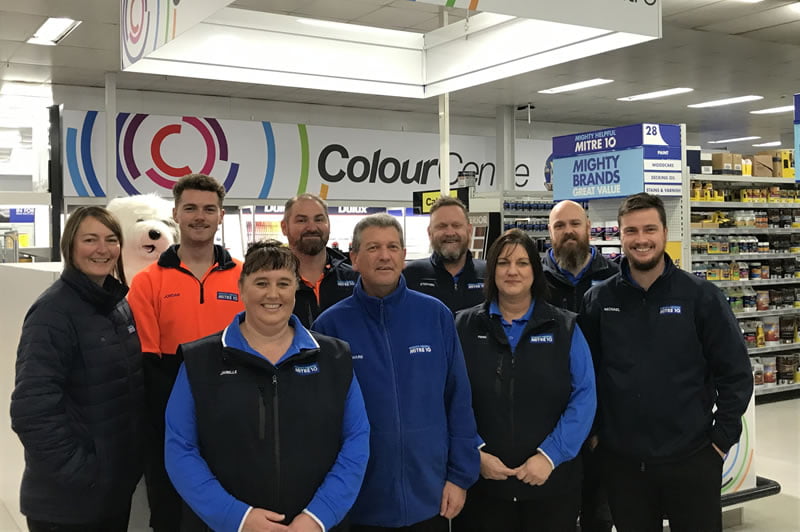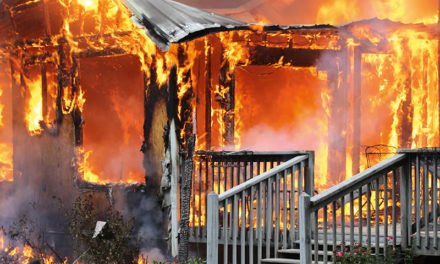In business, things can change unexpectedly, but 2020 has been remarkable. We talked with two Independent Hardware Group local leaders about how they’re getting through.
So far, 2020 has been solidly overdoing itself in the disaster stakes. Australia started the year with fire and drought, and has since rolled through plague, flood and tempest. Yet in the face of everything, small businesses are managing to not just keep going, but in some cases thrive.
We spoke with Paul Connolly, general manager of the Becks Mitre 10 chain of stores across the north and north-west coast of Tasmania about working through the area’s Category 4 Covid-19 lockdown, and to Jason Southwell, owner of four stores in Macksville and Maclean, whose stores went straight from fires to Covid.
Tasmanian lockdown
“We were doing so well…” Connolly says, ruefully. But in early April a significant Covid outbreak in the Burnie region led to a Category 4 lockdown of the region.
“The announcement came at about four o’clock on Easter Sunday,” Connolly says. “We quickly got the store managers and trade account managers on the phone. The operations manager, Donna Bailey, and I rang them and said ‘Look, we’re going to close on Monday, and we’ll get together and discuss what to do next.’ The good news was that it was a public holiday, so only a couple of stores would normally have opened anyway.”
Connolly and his team had been watching the unfolding situation nervously before this. His daughter had been studying in The Netherlands and he had been planning a European holiday in May, so he had been keeping a close eye on developments.
“In the early days, it became obvious it was more than just another flu, but we didn’t know exactly how things were going to develop,” says Connolly. “We in the senior management had store managers across our 10 sites dial in to a weekly conference call and talk about what was going on in their local towns, what the government was saying we needed to do and how to implement that.
“There was a lot – so we took some of it off their shoulders, including simple but time-consuming things: we made sure we had a list of every staff member and all their contact numbers. We gave the teams folders with all the contacts and all the relevant information that have been coming through from the government or from IHG. So when the worst did happen, it was all there.”
Fast forward to Easter and the group were able to make decisions and communicate them to staff quickly. They decided to open the main Devonport store on Monday for a few hours for trade customers. Meanwhile, the managers were on a conference call with the IHG executive leadership team.
“We’d already had our ‘pre-planning’ ratified within our own group. So we went through that with the exec team. They confirmed we were doing the right thing and provided the support that we needed at the time to make sure we could get on with it.”
Tasmanian Premier Peter Gutwein had first announced that all retail would close except for deliveries across the north-west region. Exceptions were put in place for tradespeople and essential services. “Jarrad Murfet, the trade sales manager, and his trade account managers immediately rang all their key customers to let them know what we were doing,” Connolly says. “We were really open and transparent with them as well about what we could do and what we couldn’t do.”
In the following days, that was updated to include agricultural customers and ABN holders such as hotels: “They might not be tradies, but they’ll have a handyman on staff and this was an ideal time to do repairs,” says Connolly. “So we added them to the list at our ‘Checkpoint Charlie’ trade centres.”
Checking in and out
Connolly’s team decided to close access to the retail parts of the stores and check customers’ credentials at entry through the trade areas. “This was a huge difference to what had been happening up till that point,” he says. “We’d had social distancing for some time, but that was just signage, directional traffic within the store and having staff limit the number of people in each store. We were actually really busy, particularly on weekends, because people who were on the lighter lockdowns could still come to a hardware store, or use the Click’n’Collect to have an order waiting for them.”
Overnight that changed. For the trade side, it wasn’t a huge difference. Much of the stores’ trade output is usually delivered, and there was little change. “Though lot of our trade customers had put in place their own Covid-safe processes on their sites,” says Connolly. “They weren’t keen to have lots of people coming on site at any one time. ”
But for the retail side, it was a massive change, and the north-west team realised it would have a big impact on their customers. The small regional towns they operate across didn’t have the ready access to deliveries of big urban areas. “So we offered up a free delivery service,” says Connolly. “Our utes and trucks were already on the road, so we did everything from light globes to decking. In the three weeks of lockdown, we did nearly 1000 free deliveries into the local communities we serve. Didn’t matter whether it was $5 or $500, we still did it.”

Rotating disasters
Jason Southwell and his wife Sharron own Macksville Mitre 10 and Macksville Landscaping supplies as well as co-owning Maclean Mitre 10 and Maclean Mitre 10 Trade Centre Townsend with Shaun Johnson. All are on NSW’s mid-North Coast.
“It’s a beautiful area,” he says, “but we were hit very hard and lost quite a few houses and buildings in the fires, especially out in the Nambucca Valley.”
At one point, all of Macksville prepared to evacuate as winds fanned embers and the fire front towards the town. Southwell and his wife were juggling rosters so staff could defend homes and sheltering horses from one at-risk home at their own, safer property.
“At the peak of the fires, we sold every garden hose and every hose fitting we had in a matter of days,” Southwell says. “I usually make my orders on Monday morning, for supply on Wednesday, but the fires were predicted to hit heavily on Tuesday night, so I told them it was going to be too late.”
Southwell ordered six months-worth of stock and rang the Mitre 10 warehouses directly. “I said, ‘You guys need to get this out to me by Tuesday.’ Then I rang the couriers and said. ‘Mate, this is how important it is…’”
The logistics team at Mitre 10 swung into action, picking the order immediately and readying it to go. Southwell says, “The truck driver who delivers from Coffs Harbour to Macksville made a special trip and arrived about 9am on Tuesday. I pulled my kids in to help the staff and got another person in just to get that stock away in the shortest amount of time, so the community could protect their properties as best they could.”
No sooner had rains put out the last of the fires than the threat of Covid descended. “At one point, we were uncertain whether the government was going to mandate we close,” says Southwell. “That was quite stressful. When they said hardware stores were essential services, it was great, because it meant construction could go on and people could make repairs at home. But what happened was, with everybody stuck at home, there’s only so much Netflix you can actually watch. So all of a sudden we’ve had this massive increase in foot traffic.”
Unexpected peaks
Southwell found himself faced with a surprise boom. “Obviously there’s some good news there, but trying to manage it was quite difficult in terms of staffing, stock and social distancing,” he says.
There was no time for new staff, so the normal complement dug in and Southwell gave up his day off and office days to put in solid weeks in the stores, taking his admin home at night. “Everyone’s given 110% because they understand how difficult and important it is,” he says. “And they’re happy they’ve still got jobs when so many don’t.”
Multiple sanitation stations, signage about social distancing around the store, customer traffic flow and store customer limits, including the number of people in any aisle were in place early on. “Staff are also wiping down counters, handrails, the Eftpos machines, anything we can think of to try and make sure there’s no risk of transmission,” says Southwell.
So far, the biggest risk hasn’t been Covid in the area, but stress, some of which has come from the customers. “We draw most of our stock out of our Mitre 10 warehouse, so issues with international supply chains haven’t affected us much,” Southwell says. “But the bushfires and now Covid have had impacts. For example, masks have been in short supply all year. So we do have categories in the shop that are pretty thin and it can be a little bit hard to get that stock. Most customers understand that but, sadly, some don’t. We just take it one on one and deal with each person the best we can.”
Southwell is quick to point out that a lot of the impatience has come out of a natural anxiety. “Some people in our area lost their houses, and that’s really emotional. Most of us went through the fear of the fires, and then it was straight into this.
“Of course, we also have some people who didn’t take it seriously enough – we’ve had blokes coming into the store and we’re: ‘You’re over 70, aren’t you meant to be self-isolating?’ and they’ll say, ‘I just had to quickly come down and grab something’ Trying to manage both types of customers without upsetting anybody is certainly challenging.”
In addition to huge amounts of foot traffic, deliveries increased at the Macksville and Maclean stores. “Though I don’t know if that was to do with not wanting to go outside,” Southwell says, “It was mostly big stuff!”
Learning from crises
Faced with no clear end to Covid restrictions and an uncertain economic outlook, both men were surprisingly upbeat. Southwell describes himself as naturally tending towards the negative, but “this time I’m less so, because we do look to have Covid under control and I think we’ll be fine as a business. We’ve had an unusual opportunity: we were given this chance to excel and prove to our customers – including ones who may not be as loyal or as regular as we would like them to be – that we are here with a great range, great prices and great staff,” he says, adding, “And we’re local, so the money stays local.
Connolly’s optimism encompasses his whole state. “Building is still strong here. Tassie’s had a good economy of late. That’s softened what’s potentially going to happen in the future. We don’t have the very big builders operating here, so that’s also probably helping us in the marketplace.”
Like Southwell, he puts a lot of the credit for the businesses succeeding down to his staff. Even with uncertainty – including some who were in quarantine because of links to the two hospitals with Covid outbreaks – Connolly says, “What happened in those three weeks was the people that work in our business did a magnificent job under a really stressful situation. They pulled together really well. And I hope that spirit and that cooperation can continue on.”
Several aspects of the Covid era will be kept on after the crisis passes. During the worst of the Category 4 lockdown, Connolly was running conference calls twice a week, rotating through store managers, department managers and team members.
“We were conveying a top-down message out to everyone, to keep it consistent,” he says, “but we got to hear responses from multiple voices and that’s been good for us. One other nice thing is that a lot of those online and phone meetings happen in people’s homes and it humanises everyone: you get a look into their homes, you hear their pets and their kids.”
Southwell agrees the experience increased the feeling of being a team, but also feels it reminded the community of the importance of supporting local businesses. “I think they’ll remember that. It’s too early to say what’s going to happen with the economy, but we’re still punching above our weight and I think that’s going to continue. People know that they when they come to us, they get genuine expertise, not just sales staff. They can get in and out quickly with what they want at a great price.”
While the Tasmanian stores did lose revenue during the serious lockdown, it bounced back the day they were able to fully open. “People were out in force, and it’s been that way since,” says Connolly. “Partly because there’s only been a certain amount of businesses open, but I think it’s also because we did do some of those things that made people feel better-connected to our business. I think they appreciated those free deliveries across our six regional stores.”
Other positive outcomes include a better approach to sickness, with staff being more likely to take leave to protect their colleagues and social distancing helping to reduce seasonal colds and flu as well as Covid.
Even the Category 4 lockdown wasn’t as bad as Connolly’s team had expected. He says, “Isolating the region was pretty tough, but it was the right thing to do and because the efficient way our governments reported and communicated, we could see that they were getting it under control.” While he wouldn’t want to go through it again, he’s sure they could. As for Southwell, he hopes that NSW never needs to experience a similar lockdown, but he has a plan: “Deliveries are working really smoothly now,” he says, “so if we close the stores, I’ll just go in and do all the jobs I’ve been too busy to do for the last 12 months.”
Main Image: Some of the Becks Mitre 10 team – now back in open stores again for socially distanced retail












